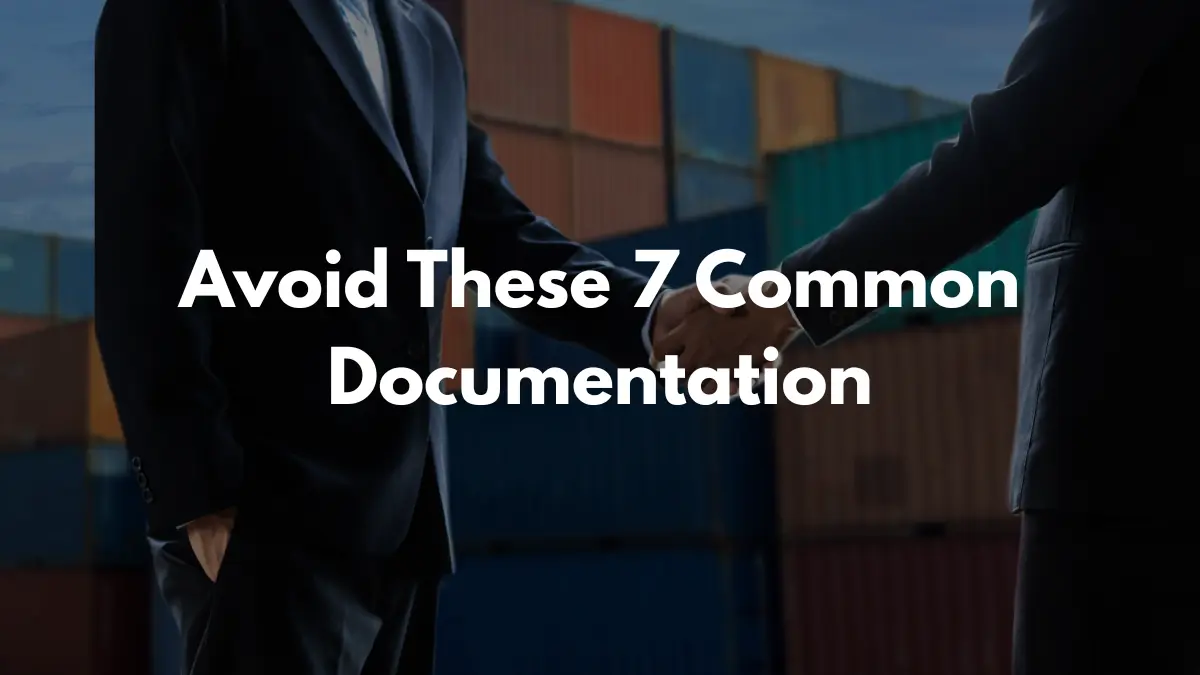Avoid These 7 Common Documentation Errors in Your First Export
Exporting for the first time can be exciting – but even a small documentation error can lead to delay, fine or shipping rejection. Whether you do clothes, food products or machines, it is necessary to correct your papers.
In this blog, we will guide you through 7 most common documents through errors and answer real questions.
What documents are required for first-time exporters in India?
This is the most searched question—and rightly so. Many new exporters are confused about what documents are actually needed.
Here’s a basic list:
- IEC Code (Importer Exporter Code) – Mandatory for all exports
- Commercial Invoice – Proves the sale value
- Packing List – Lists all contents in detail
- Shipping Bill – Main document for Indian customs clearance
- Bill of Lading / Airway Bill – Proof of shipment by carrier
- Certificate of Origin – Confirms the goods’ country of manufacture
- FSSAI License – Required if exporting food items
- Insurance Certificate – To protect goods in transit
Missing or inconsistent documents are one of the top reasons shipments get stuck at ports.
How do I avoid mistakes in commercial invoices for exports?
The commercial invoice is more than a bill—it’s a legal document used by customs. Avoid these common errors:
- Using incorrect HS code or product description
- Mismatch between invoice and packing list quantities
- Incorrect currency (e.g., INR instead of USD)
- Forgetting to include buyer/seller info and payment terms
- Not including signature/seal where required
Tip: Use export invoice templates approved by DGFT or your freight forwarder.
What is the most common reason export shipments get held at customs?
The #1 reason? Missing or incorrect documentation. Here’s what usually causes problems:
Incomplete shipping bill
- Missing certificate of origin or regulatory clearance
- Invoice and packing list mismatch
- Not complying with import country requirements (e.g., FDA for USA)
- Incorrect or missing AD code registration with customs
- Always double-check every document for accuracy before shipping.
How to correctly fill out a packing list for export?
A packing list details what’s inside your shipment. It’s different from an invoice. Here’s how to do it right:
- Include product name, weight (gross/net), dimensions, and quantity
- Mention packaging type (box, crate, pallet, etc.)
- Number each package (e.g., Box 1 of 5)
- Match every item to the commercial invoice
- Add total weight and volume at the bottom
- Ensure it’s on your company letterhead with seal and signature
Pro tip: A clear packing list speeds up customs inspection and reduces chances of damage claims.
What is the difference between shipping bill and bill of lading?
This is a common confusion for new exporters. Here’s the breakdown:
| Point of Comparison | Shipping Bill | Bill of Lading (B/L) |
|---|---|---|
| Issued By | Indian Customs | Shipping Line / Carrier |
| Purpose | Proof that export is legally filed | Proof that goods are in transit |
| Timing | Generated before goods leave port | Issued once goods are loaded on vessel |
| Use for Export Incentives | Needed to claim export incentives | Not used for incentives but required for logistics |
| Use for Payment/Ownership | Not directly used | Needed for release of payment or transfer of ownership |
You’ll need both documents to complete a successful export.
Can I export goods without a letter of origin or FSSAI certificate?
It depends on what you’re exporting and where.
Certificate of Origin (COO) is needed:
- For trade agreements like SAFTA, GSP, etc.
- If required by the importing country
- For claiming reduced duties abroad
FSSAI Certificate is needed:
- If you’re exporting any food or edible products
- FSSAI registration and product approval are mandatory
Exporting food without FSSAI or COO can result in shipment rejection at destination ports.
Final Thoughts: Let Experts Handle Your Export Documents
If you’re unsure how to manage your first export, it’s smart to work with experienced professionals. At JK International, we help first-time and seasoned exporters with:
- End-to-end documentation
- Compliance checks
- Product-specific legal guidance
- Country-specific export advisory
Ready to ship your goods without hassle? Contact JK International today for reliable export support.
- Categories:
- Export

